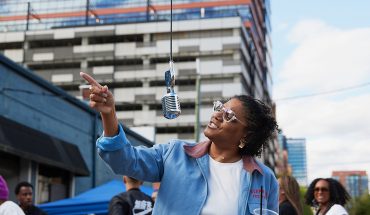illustration by Brian Hubble
Friend (n.) – One attached to another by affection or esteem
(Merriam-Webster Dictionary)
We toss the word friend around easily. There are Facebook “friends.” We call the person we just met for coffee for the first time “friend.” Introduce the person we hung out with at that conference once as our “friend.”
To me, friendship is much more. It’s a bond – a union.
For many years, my wife Jamie was my best friend. The person I wanted to speak with the moment I had news, good or bad. The person whom I trusted resolutely with each secret. We shared virtually every experience together for four years and four days of marriage, for 16 months of dating prior to being wed, for a year before we ever kissed. She was my mentor. My partner. My person.
And then we were attacked one Monday evening and that life was no more.
The morning after Jamie took her last breath I woke up to a world that was still inexplicably spinning. I looked around in disbelief. I felt like an explorer who had landed in a place that no one knew existed.
Among the lessons no one can teach you is what you ought to do when your best friend isn’t there any longer. Even without this lesson, our resilient human nature kicks in and forces us forward in the early stages of grief.
And when it needs a nudge, through it all, through the pain, friends make the difference. Friends came in the early hours at the hospital as word of the attack spread and those friends never left in the days that followed Jamie’s passing.
A thousand people showed up at the funeral and embraced her parents and me in hugs that were a temporary balm for our broken spirit. After each embrace, I would look up to see another friend who wanted to be there for us. Friends from San Francisco, Houston, Toronto, who knew that we needed them.
A common misconception, one that I shared, is that it is the immediate aftermath of loss that is the low point, but the truth is that you are numb in those initial hours and days. You hurt, yes, but something innate kicks in and keeps you moving through the paces.
The low point actually begins to drift ever lower a week after, when you realize that every day that you wake up is another day that you must face alone.
It was in those days, in the depths of my sorrow, that I began to learn what it would take to survive, and I wasn’t going to do it alone. W.B. Yeats once said, “Think where man’s glory most begins and ends, and say my glory was I had such friends.”
Yeats was right: The glory that came from my surviving the worst is wholly due to those friends who stepped up and shared the heavy burden of my grief. Even though they often said they wished that they could take some of my pain away, they didn’t realize they were actually doing exactly that every day.
“To survive this,” a local minister told me, “you need just a little bit of faith, and a lot of friends.” I would soon learn the wisdom of his words.
The favor of God
I’ve thought a lot about the concept of grace over the last two-plus years. My faith tradition teaches me that it is the unearned, often unmerited, favor of God. In my world, I have also come to believe it is the unearned, often unmerited love of those who do not have to love you, but rather choose to do so.
Friends did the things that I could not bring myself to do. They packed up our house – our life, really – and placed it in storage. They adopted our animals, helped me break contracts I no longer needed, and helped me figure out how to do the things that the law requires one to do when your spouse dies.
For months, one of my best friends stayed up with me every single night, literally to make sure I went to sleep. I could not drive while my hands were still bandaged, and he would pick me up so that I could get out of the house in the evening when it felt like the walls were closing in. He proved the depth of his friendship one night when we watched Thunder Road and Cocktail back-to-back in an ode to Tom Cruise’s artistry.
There is one word for all of that: grace.
Another close friend gave me a couch to sleep on when I was in Raleigh, wrapped my bandaged arm in a garbage bag so that I could shower, even went with me to places that I can guarantee he did not want to go just so that I didn’t have to face people alone. We still shake our heads when we recall a night where we found ourselves at a college bar with cheap beer, surrounded by students filled with the boisterous freedom of summer break, and we both burst into tears, earning confused glances and some sudden space.
Unmerited, unearned love. Grace.
Some friends presented themselves because they somehow knew I needed them. A local chef reached out to me and offered to cook for me, because she believes in the power of food to heal. That friendship took root and blossomed, and on the fifth anniversary of the night that I proposed to Jamie, three great friends and I had so much delicious food at her signature restaurant that we were all stuffed for a full 24 hours. That night we all laughed, toasted, and reflected on our shared memories. It was an uplifting evening. Perhaps even a hopeful one. She would reach out again and again even with a busy schedule – always showing up. Grace.
Others provided advice that kept me moving. One of my mentors, who happens to preach when he isn’t politicking or performing surgery, called me, heard the weariness in my voice, and said, “You can’t give up, Nation, for three main reasons. For those who loved you and Jamie, you are what we have left, first of all. Second, we all have so much work left to do on those issues that you and Jamie worked for. And, finally, you can’t give up, because if you do then Jamie will be pissed – and remember that the next life is an eternity. Do you want Jamie mad at you for thousands of years?”
With a shake of my head, and a bit of a chuckle, I hung up the phone, and kept moving. Shared grace.
And friends who had sustained severe, profound losses of their own also provided advice and wisdom. A mentor, and one of my closest friends, lost her husband not long after we met in 2004. I was 18, and while I told her how sorry I was then, I could not conceive of what the loss meant. Eight-and-a-half years later, however, she knew what my journey might be like, and she gave me advice daily that made me feel less alone in a world that seemed bleak.
The common thread between all of these friends, and the many more I could mention, is that they showed up in the small moments, not just the big ones. They called, or texted, day and night; they were in touch three months after we lost Jamie. They shared their guest room with me for five whole long months, even though at that point I was mostly drinking, crying, and not sleeping. They brought their adorable children around, breaking me out of my worst doldrums.
My friends, and our family, gave me a reason to keep going. They helped us launch the Jamie Kirk Hahn Foundation, because they said that the energy and the spirit that Jamie carried forward should not end. In the early days following Jamie’s loss, the Foundation was one thing that gave my days purpose. On what would have been Jamie’s 30th birthday, the Foundation – filled with friends – reminded us that she would live on forever in the work. In the long, hard winter that followed, the Foundation and my friends there kept me going when I wanted to give up.
Friends showed up, and they didn’t give up.
Grace. What a word. What a concept. We elected to sing one hymn together as a church family at Jamie’s memorial service: Amazing Grace. Amazing Grace, how sweet the sound, that saved a wretch like me.
If I were to add a line today I might just sing, Amazing friendship, how filled with grace, it saved a man like me.




